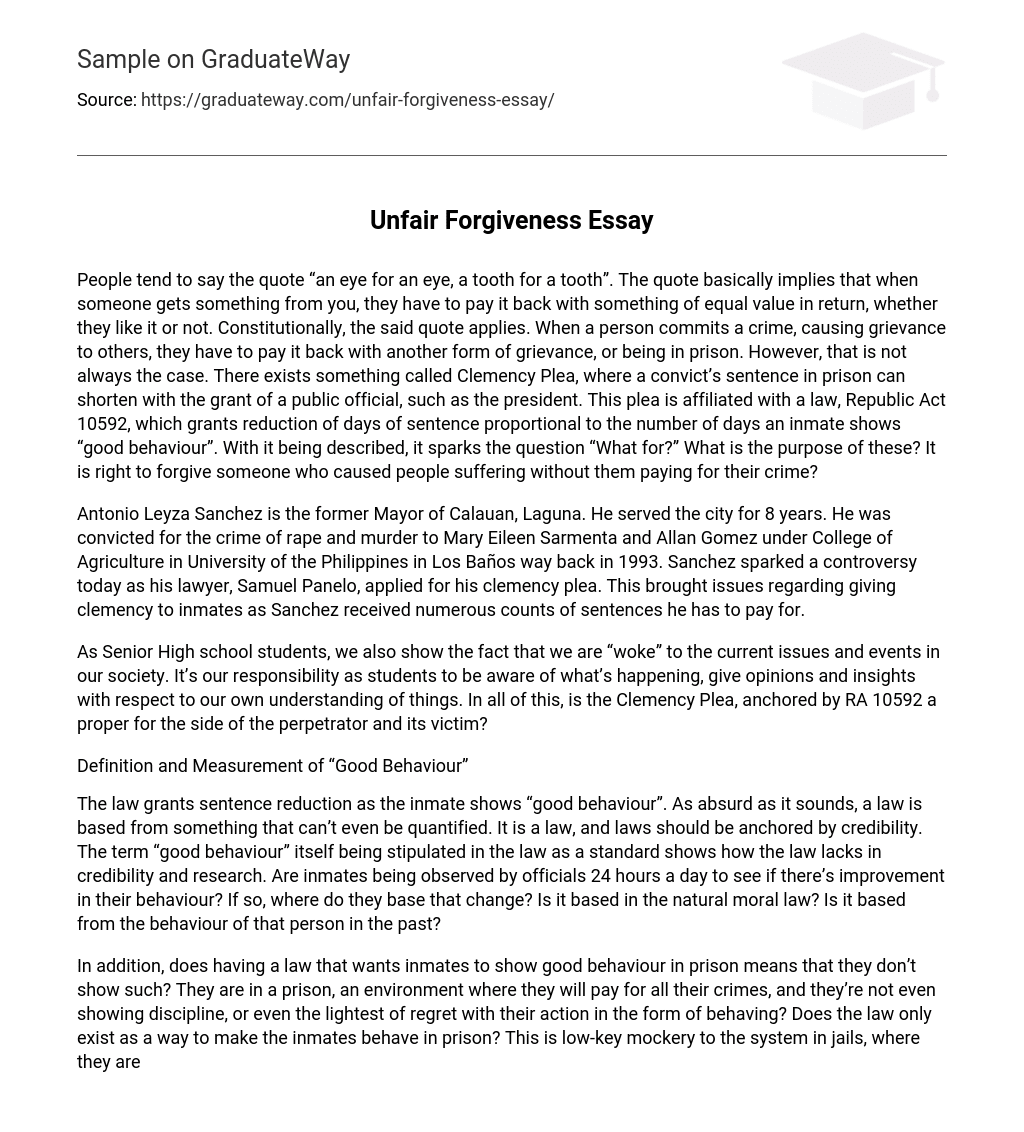People tend to say the quote “an eye for an eye, a tooth for a tooth”. The quote basically implies that when someone gets something from you, they have to pay it back with something of equal value in return, whether they like it or not. Constitutionally, the said quote applies. When a person commits a crime, causing grievance to others, they have to pay it back with another form of grievance, or being in prison. However, that is not always the case. There exists something called Clemency Plea, where a convict’s sentence in prison can shorten with the grant of a public official, such as the president. This plea is affiliated with a law, Republic Act 10592, which grants reduction of days of sentence proportional to the number of days an inmate shows “good behaviour”. With it being described, it sparks the question “What for?” What is the purpose of these? It is right to forgive someone who caused people suffering without them paying for their crime?
Antonio Leyza Sanchez is the former Mayor of Calauan, Laguna. He served the city for 8 years. He was convicted for the crime of rape and murder to Mary Eileen Sarmenta and Allan Gomez under College of Agriculture in University of the Philippines in Los Baños way back in 1993. Sanchez sparked a controversy today as his lawyer, Samuel Panelo, applied for his clemency plea. This brought issues regarding giving clemency to inmates as Sanchez received numerous counts of sentences he has to pay for.
As Senior High school students, we also show the fact that we are “woke” to the current issues and events in our society. It’s our responsibility as students to be aware of what’s happening, give opinions and insights with respect to our own understanding of things. In all of this, is the Clemency Plea, anchored by RA 10592 a proper for the side of the perpetrator and its victim?
Definition and Measurement of “Good Behaviour”
The law grants sentence reduction as the inmate shows “good behaviour”. As absurd as it sounds, a law is based from something that can’t even be quantified. It is a law, and laws should be anchored by credibility. The term “good behaviour” itself being stipulated in the law as a standard shows how the law lacks in credibility and research. Are inmates being observed by officials 24 hours a day to see if there’s improvement in their behaviour? If so, where do they base that change? Is it based in the natural moral law? Is it based from the behaviour of that person in the past?
In addition, does having a law that wants inmates to show good behaviour in prison means that they don’t show such? They are in a prison, an environment where they will pay for all their crimes, and they’re not even showing discipline, or even the lightest of regret with their action in the form of behaving? Does the law only exist as a way to make the inmates behave in prison? This is low-key mockery to the system in jails, where they are saying that the systems in jails aren’t tough enough to discipline inmates? With such, then they should just apprehend laws that can discipline inmates instead of ones that look like they’re begging the inmates to behave in a form of compensation.
Unfair to the Aggrieved
The purpose of them being sentenced in prison is for them to pay for their crime and to give justice to what they did to their victim. The length of sentence they get is proportional to the severity of the crime they did. Some even get sentences longer than the human lifespan. How can the victim or their family sleep sound at night if they’re thinking that the one who harmed them is now out, living a normal life without paying their crime equally, and still have a chance to make more crime? It removes the “sense of justice” they should feel from the perpetrator having the feeling of being locked up in the prison to pay for their bad actions, as well as the “sense of security” that they should also feel as the perpetrator is now in the prison and can’t harm them or their family again. The very fact that the perpetrator exists already serves as a threat to the victim and their family as their crime will and will always leave a “scar” to them, and this “scar” will always bleed the moment they feel the perpetrator can harm them again.
Contradicts the Basic Laws
If someone does something that is against the law, they would of course get arrested and will pay a fine or serve in prison, depending on the severity of their crime. If their sentence will shorten as they behave, then what’s the point of them even serving at all? Can’t they just behave in the first place so that they won’t get involved with crime? Yes, they are serving in prison and “might” show regret for their actions, but will that so-called “regret” equally pay what they did to the victim? They may cause trauma that even if they kneel to their victims to express their sincerity, nothing will change. They already did the crime, and they need to pay for it. If the law itself makes people pay for their actions if they violate in a heavy way, why such very light things like behaving and showing regret enough to give them “unpay”?





